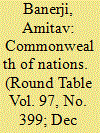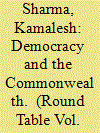| Srl | Item |
| 1 |
ID:
085549


|
|
|
| 2 |
ID:
102745


|
|
|
|
|
| Publication |
2011.
|
| Summary/Abstract |
In this article, the author takes a wide-ranging look at the ways in which the Commonwealth has been working towards the realisation of its core values and examines the areas where further work needs to be done.
|
|
|
|
|
|
|
|
|
|
|
|
|
|
|
|
| 3 |
ID:
164826


|
|
|
|
|
| Summary/Abstract |
In this article, we draw on the contradictions in, and the geopolitics of, international election observation in the Democratic Republic of the Congo’s 2006 and 2011 elections to identify and analyse the emergence of a neo-third world behaviour among African states intended to counter the excesses of Western liberal democracy promotion on the continent. We argue that the decision by African states to quickly endorse the 2011 elections and close ranks around Joseph Kabila’s government, amidst mounting international criticisms of the electoral process, should be understood in the context of a new form of third worldism that is emerging in the global South in response to the unrestrained exercise of US power.
|
|
|
|
|
|
|
|
|
|
|
|
|
|
|
|
| 4 |
ID:
163070


|
|
|
|
|
| Summary/Abstract |
Norm contestation by local actors has emerged in recent years as an explanation for the failure of norm diffusion. This article contributes to the literature on norm contestation by analysing how norms diffused by the Organisation for Security and Cooperation in Europe (OSCE) pertaining to election observation and free and fair voting are re-constituted and contested by domestic actors in Kazakhstan. The study contributes to the idea of ‘constitutive localisation’ by emphasising a more fundamental level of disagreement beyond just congruence between the diffused norm and local beliefs; by demonstrating contestation can occur in the later stages in the norm diffusion cycle; by focusing on the micro-politics of contestation by local actors involved in the implementation of diffused norms; and by revealing how norm contestation is not necessarily a process of emancipatory politics, but a strategic act to serve authoritarian consolidation. Utilising a four-fold framework, the analysis illustrates how norms, while initially accepted by Kazakhstani authorities, are reconstituted through political discourse and/or practice, creating the moment of contestation. While this contestation is instrumentalised by political elites for their own advantage, it also remains an important element of agency within a normative order which they had little previous control over.
|
|
|
|
|
|
|
|
|
|
|
|
|
|
|
|
| 5 |
ID:
168554


|
|
|
|
|
| Summary/Abstract |
Research on international election observation shows that observation reduces fraud, encourages participation, and boosts confidence in the election. However, this conventional account misses the negative, violence-inducing potential of observer criticism. This is the first study examining how observer criticism influences post-election violence. Democracy depends on the loser’s consent, and the willingness of election losers to be governed by the winners can be influenced by observer criticism. When reputable observers criticize the credibility of an election, they can encourage losers to challenge the result. Observer criticism strengthens the electoral loser by legitimizing a challenge and serving as a focal point for mobilization. Using data on post-election violence in thirty-eight countries in sub-Saharan Africa since 1990, I show that internationally condemned elections are more likely to turn violent than not-condemned elections. These results are robust to various control variables (including observer presence and election fraud) and accounting for potential selection, spuriousness, endogeneity, and omitted variables.
|
|
|
|
|
|
|
|
|
|
|
|
|
|
|
|